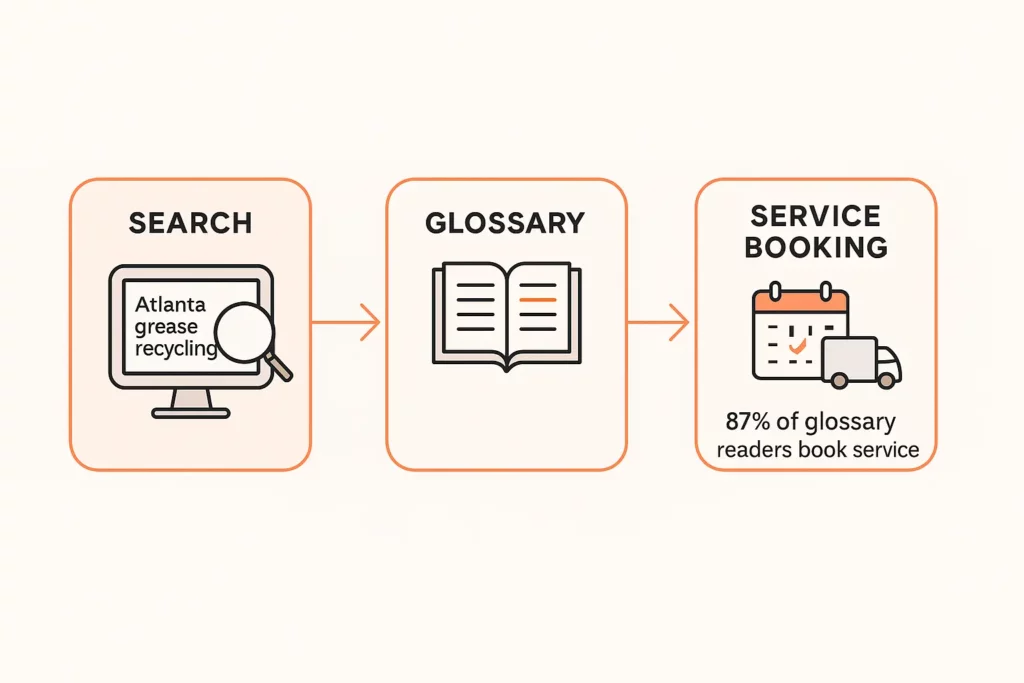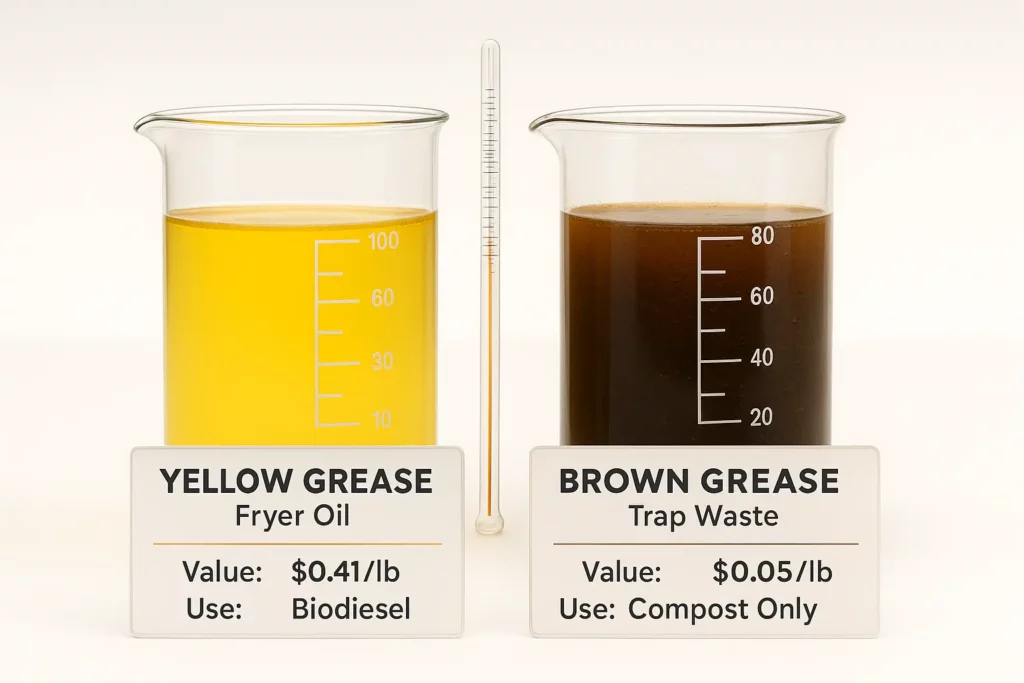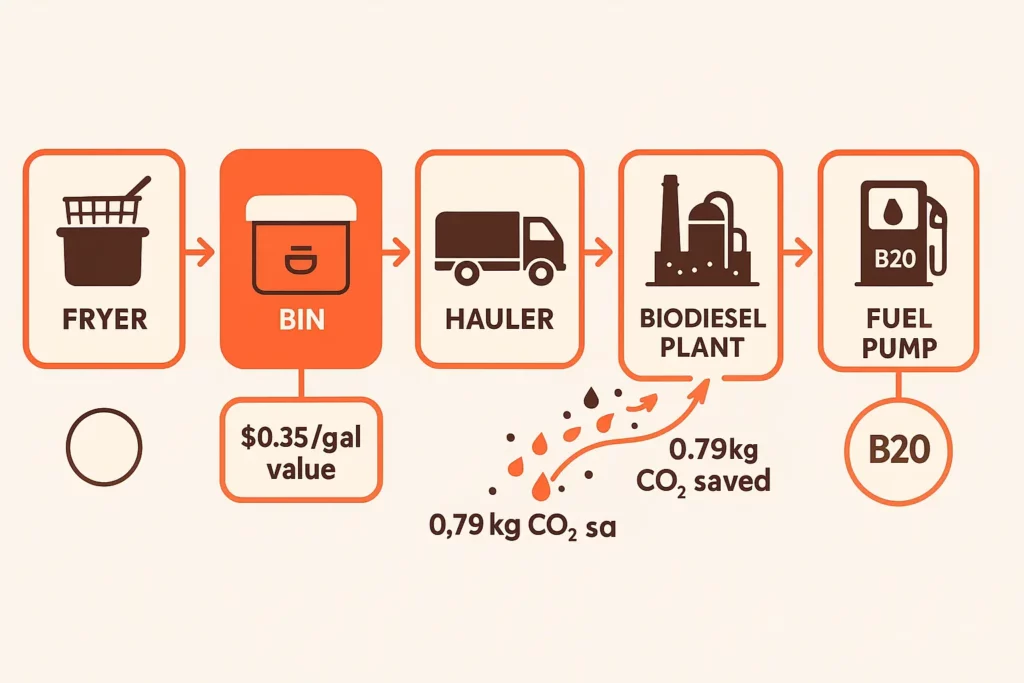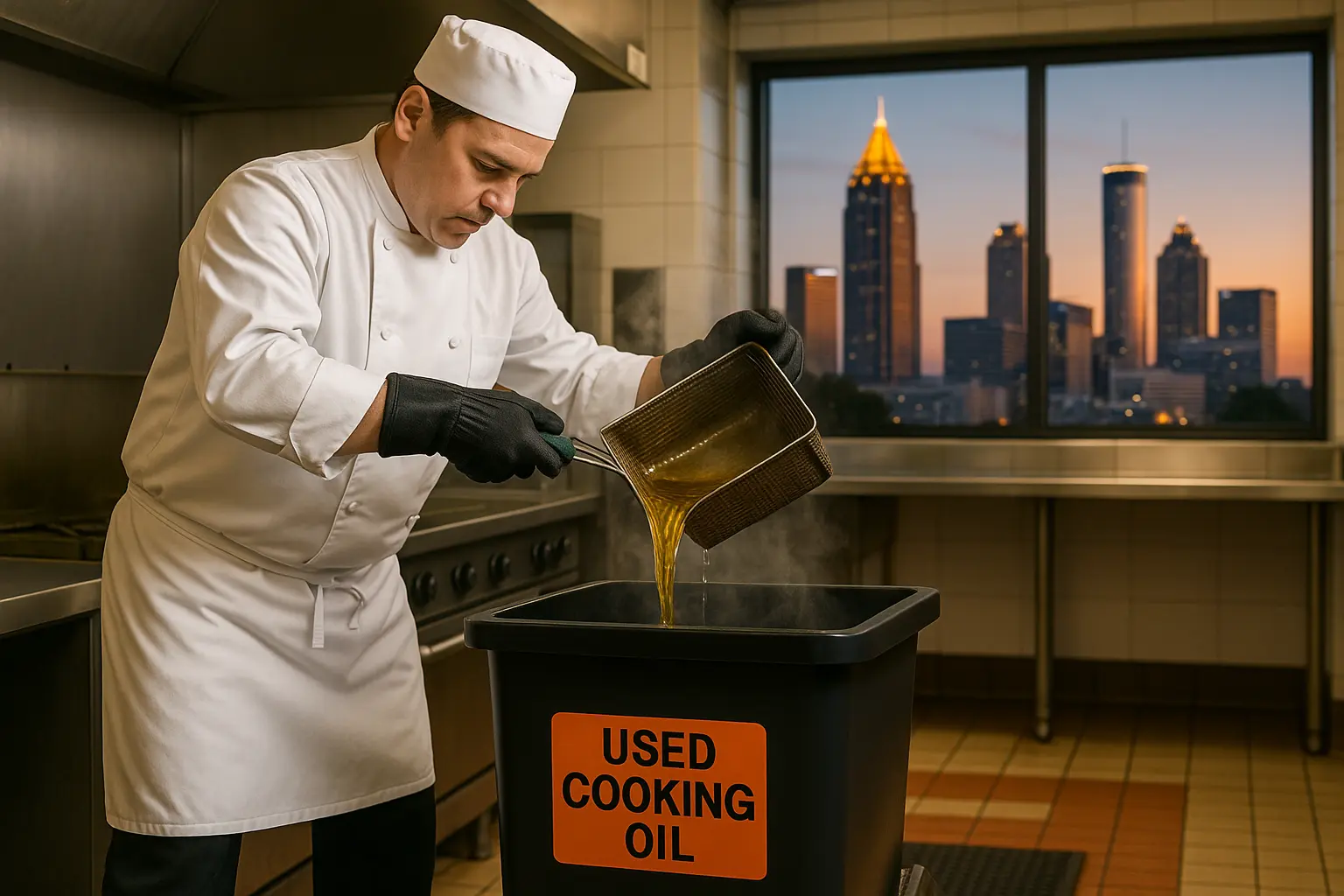Table of Contents
Why This Page Matters
Grease mismanagement drives more than half of Atlanta’s sewer blockages, prompting the City’s Grease Management Program and strict permitting fees for every trap on site. At the same time, each gallon of used cooking oil can fetch 21 to 41 cents when recycled as “yellow grease,” turning a disposal headache into a revenue stream. This page gathers the industry’s core terms, state rules, and real world answers in one place so food service owners, chefs, and facility managers can stay compliant, prevent fines, and capture every dollar their fryer oil is worth.
How To Use This Glossary
Skim the two tables below for plain English definitions from A to Z, then jump to the FAQ for quick answers to licensing, pickup frequency, and payment questions.

Glossary Table B-M
| Term | Definition |
|---|---|
| Biodiesel | Renewable diesel substitute made by transesterifying yellow grease or other fats. |
| Brown Grease | FOG pumped from grease traps; high contaminants make it fit only for compost or energy recovery, not animal feed. |
| Cubies | Five gallon cardboard/foil oil jugs common in small kitchens; must never be reused for waste oil. |
| FOG Program | Local ordinance requiring traps, manifests, and inspections to keep fats, oils, and grease out of sewers. |
| Grease Trap | Hydraulic device that cools wastewater so grease floats and solids sink, protecting pipes. |
| Manifest | State approved haul sheet documenting each load’s volume, origin, and disposal site, mandatory under GA Rule 391 3 6 .24. |

Glossary Table N-Z
| Term | Definition |
|---|---|
| Neutralizing Agent | Alkaline wash (e.g., KOH) used to remove free fatty acids before biodiesel conversion. |
| Padlock Bin | Outdoor steel container with lockable lid that deters grease theft, now a $75 million problem nationwide. |
| RIN Credit | Renewable Identification Number issued when recycled grease becomes biodiesel, underpinning buy back pricing. |
| Southeastern FOG Alliance | Non profit portal that processes Georgia transporter registrations and publishes the “approved hauler” list. |
| Trap Capacity | Total gallons a grease interceptor can hold before 25% FOG threshold triggers mandatory pump out. |
| Yellow Grease | Relatively clean fryer oil worth more than brown grease and widely turned into animal feed or fuel. |

Atlanta & Georgia Compliance Essentials
All food service establishments in Fulton County must file a Grease Management permit and pay $300 to $2,400 annually, scaled by the number of traps, plus keep manifests for three years. Any company hauling FOG must hold an active Georgia Commercial Waste Transporter registration and pass a vehicle inspection arranged through the Southeastern FOG Alliance before hauling a single gallon. Failure to comply can trigger sewer surcharges and code enforcement fines. Linking your trap cleaning schedule with a registered hauler like GreaseConnections closes the paperwork loop automatically, helping you sail through health department audits.
Image: permit checklist with City of Atlanta seal and GA EPD logo
Frequently Asked Questions (Part 1)
Q: How often should my trap be pumped?
A: When FOG exceeds 25% of liquid depth or every 90 days, whichever comes first, to avoid blockages and fines.
Q: Do I get paid for used oil?
A: Yes. Market pricing tracks USDA yellow grease reports; restaurants typically earn 21 to 41 cents per pound, credited on pickup.
Q: Can I pour small volumes down the drain with hot water?
A: No. Grease solidifies downstream and causes “fatbergs,” a plumbing emergency that city crews trace back to your permit.
Q: What paperwork must I keep?
A: Manifests for every haul, the current GA Transporter registration, and your City of Atlanta permit, retain three years for inspection.
Frequently Asked Questions (Part 2)
Q: What’s the difference between yellow and brown grease?
A: Yellow grease is fryer oil with low free fatty acids, easy to recycle and higher value; brown grease is trap waste, high contaminants, and costly to process.
Q: How do I stop grease theft?
A: Install a lockable bin, schedule timely pickups, and post surveillance. Thieves cost U.S. restaurants up to $75 million yearly.
Q: Will switching to hard fats solve the problem?
A: No. Even solid shortening liquefies at fryer temperature and becomes FOG the moment it cools in pipes.
Q: Is composting fryer oil legal?
A: Only in residential volumes under local solid waste rules; commercial kitchens must recycle through a licensed hauler.
Revenue & Sustainability Benefits
Every 200 gallon tote of yellow grease recycled into biodiesel offsets roughly 1.9 metric tons of CO2 versus petroleum diesel, supporting ESG goals and customer facing carbon claims. Georgia’s renewable fuel producers buy filtered yellow grease locally, reducing haul miles and keeping dollars in Fulton County. Restaurants advertising “zero waste frying” see higher diner loyalty and can feature diversion stats on menus and social posts. Grease Connections tracks your collected volumes and provides monthly sustainability certificates, ready for franchise audits or LEED reporting.
Choosing A Licensed Hauler
Confirm your vendor’s Georgia registration number on the Southeastern FOG Alliance database and ask for proof of manifest submission after each pickup. Reputable haulers also carry $2 million liability coverage and provide covered, leak proof containers to meet City of Atlanta BMPs. Grease Connections exceeds these standards, offers real time fill level alerts, and rebates oil value directly to your account, no hidden “service fees.” Call or text (770) 284-4646 to schedule a free on site audit today.
Image: Grease Connections vacuum truck beside secured bin
Service Workflow: From Fryer To Pay Out
- Technician installs coded, lockable bin.
- Kitchen staff empty cooled oil nightly; smart sensor records volume.
- When bin hits 80%, route optimization software schedules pickup.
- Sealed vacuum truck arrives, prints digital manifest, and syncs data to city portal.
- Oil reaches EPA approved plant for biodiesel processing; RIN credits are generated.
- You receive payment and monthly sustainability certificate.
This friction less loop keeps you compliant, prevents spill risks, and converts waste into a new income stream.
Give Grease Connections a Go
Atlanta’s sewer system, your fire code rating, and your bottom line all hinge on how you handle fryer oil. Schedule a five minute phone consult with Grease Connections and unlock higher rebates, automated compliance, and true zero waste frying. Call (770) 284-4646 or email info@greaseconnections.com now, before the next health inspection is on the calendar.









